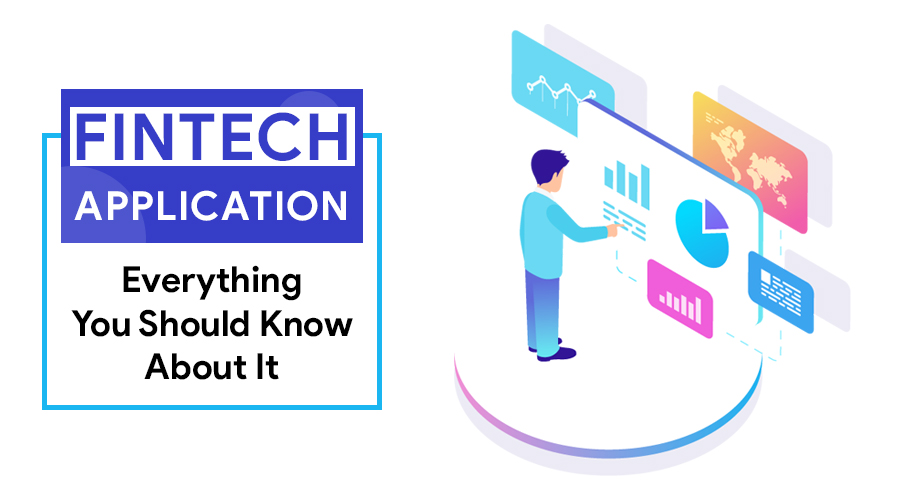Fintech Application: Everything You Should Know About It

Although the FinTech space along with the FinTech application developers is there for a few decades yet it is the daunting one to define explicitly. Once it is only there to refer to the tech startups and established enterprises. Gradually over time, banks and other financial institutions have entered into a major role too.
Of course, it enriches this application development but consumers are getting much more addled regarding their financial solutions, risks, and benefits. Even sometimes they can’t choose the appropriate FinTech services and products. This guide is here to help you through this!
What is actually a FinTech application?

FinTech (Financial Technology) is a technology that can be used for improving financial services and products for the sake of the consumers. ATM was introduced in the late 1960s as the first technological advancement of FinTech application.
It is a term given to technology that is integral for the rapid redesigning of financial services and products. Considering this point; its FinTech application which makes advanced lending and banking products more accessible, feasible, and faster than ever.
Some outstanding FinTech products available worldwide
A wide array of FinTech products is available worldwide. It includes an improved version of the existing products as well as some new products. Let’s have a glimpse of some of the unlimited availability of FinTech products below:
- Digital Wallets: Google and Apple are the leading technology enterprises not actually financial institutions. Yet they do offer financial products and these are done so by Google Pay and Apple Pay along with other contactless payment options. Only by allowing these applications on your smart wearables and Smartphones, you will be able to make contactless payments easily by collaborating with your banking service.
- Cryptocurrency: These curries originally existed in digital form only but were transferrable too at the same time. Like traditional and hard currencies these can’t be regulated by the government but allow the user to develop a strong public network as well.
- Digital Banks: It is also termed neobanks and challenger banks. These banks don’t own any physical location yet can be accessed through smartphones only. It uses certain advanced technologies to display its smart features like enhanced security, cashback, smart saving features, multi-currency support, analysis, and spending insights. Each country has a couple of Neobanks or challenger banks.
- Robo Advice: This automated investment platform leverages Machine Learning and AI (Artificial Intelligence). It is reliable for managing ETFs (Exchange Traded Funds) investment profiles. As it is based on the investment goals, risk appetite, and selected investment amount its management is of utmost crucial.
- Unsecured Small Business Finance: Small business finance now becomes much more accessible with the help of FinTech. By offering any commercial or residential property as the security the loan amount can be borrowed. In general, loan offers by the banks need any property of the same amount to give as a mortgage. But this all-new small business finance leverages the latest Fintech technology that comes with flexible terms and better rates of approval to increase accessibility.
- Peer-to-Peer Lending: It is a unique lending type in which a group is made by a third-party consisting of people who are looking for a loan for their respective businesses. A rate will be provided to the borrowers which is determined on the basis of the risk. In this case, investors gain a handsome interest rate depending on the time of the investment along with risk appetite individually.
What are FinTech companies?
Initially, FinTech companies are considered tech startups but it is not like that! Rather, it is an organization that uses advanced technologies for improving or developing financial services and products. Then these are being sold amongst the companies of financial sectors like banks and other financial institutions.
In almost every country, banks are performing extensive experiments by partnering with FinTech app developers regarding innovative products for consistent FinTech innovation. Though banks aren’t actually FinTech companies yet to cope with the changing technological pace they are too adapting agile approaches and tailoring their own FinTech products.
Now it’s become obvious that the FinTech organizations, tech companies, and banks have collaborated together for bringing out the light the latest FinTech innovation. Earlier, only the companies which are supposed to develop FinTech applications are known as FinTech companies. But now, even if the banks and other financial institutions can bring a change in the FinTech application is regarded as FinTech organizations.
How regulation is performed for FinTech?
Regulation of FinTech services and products is coupled with varied levels. The corporate regulator of every nation takes multiple essential actions for these services and products for encouraging competition and innovation by protecting the consumers.
Even there are some subcontinents that allow FinTech organizations to test their services and products thoroughly before releasing them to the market. Even acquiring the license by the organization is completely dependent on this factor.
Then, an administrative group is developed to secure the consumers that they are using licensed as well as reliable services and products for the welfare of their businesses. Owning a code of conduct by the FinTech company is only limited to a few countries for the sake of self-regulation.
Some Impeccable Benefits of FinTech Application

Some incredible benefits of FinTech application are mentioned below for your reference:
- Price: Affordable FinTech products are always good for businesses and consumers. It is so; because it makes use of the algorithms to judge lending risk in a much more precise way due to the deficit of the legacy system.
- Accessible financial products: FinTech application has incredibly heightened the accessibility of lending and banking services and products. Now, small and medium businesses can easily enjoy better financial access via FinTech products. As consumers receive a clear insight into interest rates and their expenses via risk-based pricing they can enjoy numerous benefits as well. Apart from savings accounts, with the introduction of automated investing, now people in the regional areas don’t have to visit the branch for any banking transactions.
- Improvisation of the finances: Several FinTech products come with the motto to improve the financial status of the people and provide them with a better way of finance management. Typically, banks do so by analyzing and giving you insights into your invested money.
Is there any risk associated with FinTech?

As everything possesses some limitations, FinTech also has a few contrary to its lots of advantages. Let’s look at its drawbacks:
- Less regulation- Certain FinTech companies and products tend to perform outside of the conventional financial landscape. Hence, their services may be bound to a specific area only and filled with pending regulations at the same time. For instance, a credit license is not necessary to sanction business loans by the small business finance provider. Although implemented laws are there for your protection yet people look for their license and the way it’s regulated to assure its service quality.
- New companies: Certain organizations and companies prefer to acquire FinTech applications but possess less experience than banks. Therefore before applying for the application to such companies, it becomes imperative to check whether they are licensed appropriately or not. You can do so by having a look at the reviews and disclosure statements as it can ensure you that you are going to buy the right products from a trustworthy company.
FAQs most asked by the people regarding FinTech application
- What an incumbent refers to?
An incumbent refers to a large company that has been established as a part of the finance sector, generally a bank.
- Is a bank called a Fintech?
Yes, because banks provide several innovative FinTech services and products to the people.
- Are leading tech institutions like Google and Amazon finTech organizations?
While talking about the leading tech enterprises such as Google and Amazon can be referred to as FinTech organizations. It is so; because they too offer financial products and services to the people to a limited extent only.
These are the lesser-known facts about FinTech applications. The unbeatable advancements in technologies including its remarkable services and products not only make the finance sector much easier but also easily attainable and accessible. Now, people don’t have to worry much regarding any important fund transfer, banking transactions, and making payments anymore.































































